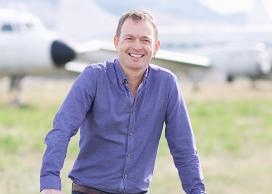Research in focus: Greg Garrard
Learn more about the work of our researchers at UBC

June 13, 2022
Name:
Greg Garrard
My pronouns:
he/him
Title:
Professor of Environmental Humanities
Department/Unit:
Faculty of Creative and Critical Studies/English and Creative Studies
Location:
Kelowna
Year I started working at UBC:
2013
Provide an overview of your research in 75 words or less:
'Nature' and 'culture' are two shaky, somewhat mobile, domains of knowledge, demarcated by Western societies, that profoundly shape the pursuit of knowledge in universities – they live in different buildings! I'm fascinated by their interaction and interpenetration - how art alters landscapes, and vice versa, for example, or how enculturated gender and biological sex difference affect one another. More narrowly, I read and teach environmental writing and books about animals.
What first motivated you (or motivates you) to conduct your research?
Two things: the exogenous motivation is the unfolding global environmental crisis, which I registered first in terms of biodiversity loss, and more recently climate change. I became interested in environmental ethics, and then wondered if the same questions could be explored through literary studies - what became known as 'ecocriticism'. The endogenous motivation is that I'm endlessly curious and sceptical, and therefore grateful to have job in which I can indulge those predilections.
What do you hope will change as a result of this research?
I'm leading a SSHRC-funded project called 'Kelownafornia: Cultures of Nature in the Okanagan Valley'. When it's completed, we hope to have illuminated the interactions of culture and nature in the Okanagan in the last century, as for example in the long debate about the South Okanagan National Park. It's seldom noticed that the region has lots of species at risk because of the US/Canada border. So how do nationalism and environmentalism interact?
Are there any research collaborators you'd like to acknowledge and why?
I'm part of an NFRF-funded project called 'Living with Wildfire'. I've learned so much about wildfire from Mathieu Bourbonnais, Kevin Hanna, Lael Parrott, John Janmaat and their grad students. But multidisciplinary collaborations take time to become genuinely interdisciplinary, as collaborators learn to understand and respect their distinct epistemic cultures, so I want to keep going!
What have you learned during your research that has surprised you the most?
I'm always learning surprising things! Recently, I've been researching the history of pastoral (a literary mode depicting humans in a state of harmony with their environment), and I've been reading the work of scholars who've shown how widely that mode was invoked to celebrate colonialism. I'm learning a lot about the culture and ecology of fire suppression in North America, and finding out about hawks and falconry from Helen McDonald's superb 'H is for Hawk'.
- Our people
- Research
- Research in focus






